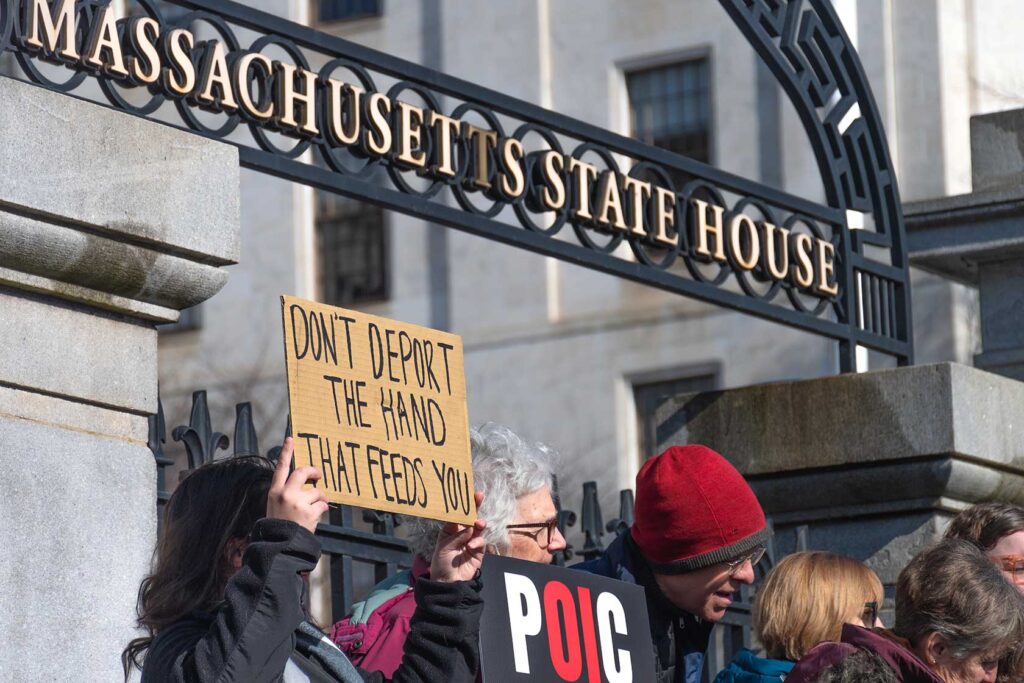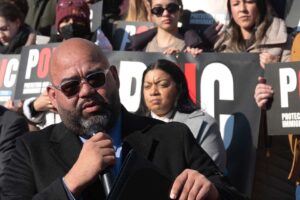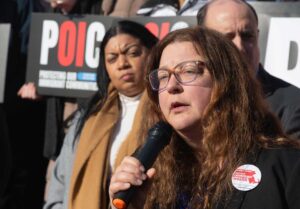‘It’s going to be a battle every day’ as Boston’s immigrant communities face new federal policies
Trump’s first weeks marked by massive anti-immigration push

A slew of new policies from the Trump administration, focused on immigration, have left immigrant communities scrambling.
Local advocates said that, in many cases, immigrants have largely stopped living their daily lives — not showing up at work, school or church — out of fear of interactions with federal immigration officers and deportation.
The federal policies have been met by local efforts to push back on the anti-immigration measures.
“For the next four years, it’s going to be a battle every day to really keep our communities safe,” said Geralde Gabeau, founder and CEO of Immigrant Family Services Institute.
‘Intense’ spread of new federal policies
Starting in the first days of his second term, President Donald Trump announced a host of policies aimed at restricting immigration and the rights of immigrants in the United States. He signed many of the executive actions hours after his inauguration.
Prominently, he declared a national emergency at the border between the United States and Mexico. That action grants the military expanded powers to complete work on the border wall and to deploy forces in response to what the Trump administration has termed an“invasion” at the southern border.
That order also reinstated the Migrant Protection Protocol — commonly called the “Remain in Mexico” policy — which he created and implemented during his first administration. Under the policy, migrants seeking asylum at the southern border were given notices to appear in immigration court but then were sent back to Mexico, generally to areas where they faced potential kidnapping, rape and torture by criminal groups there.
Perhaps most controversially, Trump signed an executive order seeking to limit birthright citizenship — the automatic status of U.S. citizenship conferred on essentially all children born in the country — to only the children of parents who are legally and permanently in the United States. A move that has faced much criticism that it violates the U.S. Constitution.
Birthright citizenship in the United States was enshrined by the 14th Amendment to the Constitution in 1868, in the wake of the U.S. Civil War.

Sen. Adam Gomez speaks at a rally launching the “Protect Our Immigrant Communities” campaign, a legislative push to create new protections in response to the actions of the Trump Administration. The campaign centers three pieces of legislation separating local law enforcement from federal immigration officers and supporting access to legal counsel for immigrants. PHOTO: AVERY BLEICHFELD/BAY STATE BANNER
The amendment offers citizenship to anyone born in the United States and is “subject to the jurisdiction thereof” — language that the Trump administration claims doesn’t extend to undocumented immigrants who, he said, are not subject to the jurisdiction of the United States.
That right has been widely accepted, including by the Supreme Court, in a case over 100 years ago, which considered that language.
In that case, United States v. Wong Kim Ark, the High Court ruled in a 6-2 decision that, with limited exceptions such as the children of foreign diplomats, birthright citizenship as outlined by the U.S. Constitution extends to any children born in the United States.
“On top of that, legal experts and federal agencies, including the State Department and Social Security Administration, have recognized this in their policies for decades honoring U.S. citizenship based only on us birth certificates,” said Jacob Love, a senior attorney for Lawyers for Civil Rights. “In other words, all you have to do to prove you are a U.S. citizen in order to get a passport or a social security card for the last 50, 60, 70, years is produce a U.S. birth certificate.”
Love is part of a lawsuit challenging the executive order in federal court.
If implemented, the policy would mean that agencies like the State Department and Social Security Administration under the Trump administration would not issue documents like passports to the children of undocumented immigrants or those with temporary status.
“It’s going to make folks’ lives difficult on a practical level — profoundly difficult — but more than that, this is going to be incredibly stigmatizing,” Love said. “It is in effect, stripping people of their national identity.”
Advocates say the move would cause massive stress for immigrant mothers.
“It creates a nightmare,” said Dieufort Fleurissaint, chair of Haitian-Americans United. “It creates a lot of stresses for the pregnant women who stated that, ‘My God, this is really, really terrible. How are we going to deal with that?’ They just don’t know how.”
At the end of January, Trump revoked the temporary protected status for Venezuelans in the country. The status allows people from other countries that face war or natural disasters to reside and work in the United States without threat of deportation for a limited time. The revoked status for Venezuelans impacts more than 300,000 people, according to the New York Times.
In his first term, Trump attempted to end temporary protected status for Haitians and migrants from El Salvador — an effort that was complicated by federal courts.
Trump’s immigration policy push has extended, too, beyond just executive authority. On Jan. 29, Trump signed new legislation passed by Congress — the first of his new term — that mandates federal detention of undocumented immigrants accused of crimes like theft and assaulting a law enforcement officer, as well as others that cause death or bodily injury.
The Trump administration, since taking office, has framed its efforts as an attempt to take immigrants with criminal backgrounds off the streets. But reporting by the New York Times has found that federal agencies have been opaque about who, specifically, has been detained. Former immigration officials quoted in that report said they thought that to reach the arrest numbers that ICE is reaching would require detaining hundreds of nonviolent offenders daily.
Locally, reporting from the Boston Globe has highlighted immigrant nonviolent immigrant detentions. And studies have shown that immigrants tend to commit less crimes than U.S.-born people.
Boston’s communities grappling with fallout
Those policies have left immigrant communities in the Boston area scrambling and in fear.
“They are very frightened at the moment,” Fleurissaint said. “We received calls throughout this where they have appointments [and they wonder], should they go to the appointments? People are trying to hide, not to go out.”
Fleurissaint said that he heard from people who didn’t go to church, skipped work or didn’t send their kids to school.
Gabeau said her organization, Immigrant Family Services Institute, runs English classes for immigrants across the state. In the days after the inauguration, attendance at those programs dropped sharply.
“I’m receiving all of these text messages from the teachers saying, ‘Did we cancel classes?’ And I’m like, ‘Why would we cancel classes?’ They said, ‘Our class used to have 30 students, and now we only see four or five,’” Gabeau said. “It’s like a panic wave, where people are so afraid that they don’t want to do their day-to-day activities.”
For expectant mothers or immigrant families who were considering having more children, actions like Trump’s effort to revoke unlimited birthright citizenship leave them grappling with what it will mean for children — especially if they already have kids who are citizens.
“Some parents have U.S. children [who were] already born here and got United States citizenship,” Fleurissaint said. “But what about the other children they’re going to have?”
Fleurissaint called it a “nightmare” for some families. Love, too, pointed to this dynamic.
“Children in the same families will be viewed as completely different from the government’s perspective — and lesser than their own siblings who were born in the exact same circumstances as they were,” Love said.
Overall, they said that the new Trump administration push in the past weeks has been alarming in its scope and pace.
“It seems that the second chapter of the President Trump administration has been, so far, much more hurtful, much more dangerous and much more challenging for all of us, especially the immigrant community,” Fleurissaint said.
Though it’s been weeks since Trump took office, it feels like it’s been much longer, Gabeau said.
“There’s so much going on in just a week-and-a-half, we feel that we have been in this administration for a full year,” she said. “That’s the reason why it’s scary. It’s scary to see the intensity of those actions on all of us.”
Gabeau said the actions were expected but the intensity was not. For example, the scale of some of the actions — like attempting to shift things outlined in the constitution, like birthright citizenship — has been alarming.
“For the new administration to come and try to tear that apart, I think it really sends a strong message that we are in a new era and that we need to stand firm and fight,” she said.
Massachusetts pushes back
But advocates and legislators in Massachusetts are pushing back.
At a press conference on the steps of the State House on Jan. 29, state legislators and advocates launched a campaign promoting Massachusetts legislation aimed at supporting immigrants in the Commonwealth.

Elizabeth Sweet, executive director of the MIRA Coalition, addresses advocates and press at an event on the steps of the State House, Jan. 29. The press conference marked the launch of a campaign focused on two pieces of legislation supporting immigrants in the commonwealth amid a federal push against immigration. “Immigrants are such valued members of our communities here in Massachusetts, are contributing so much and are living with so much fear right now,” Sweet said in her remarks. PHOTO: AVERY BLEICHFELD/BAY STATE BANNER
“Immigrants are such valued members of our communities here in Massachusetts, are contributing so much and are living with so much fear right now,” said Elizabeth Sweet, executive director at the Massachusetts Immigrant and Refugee Advocacy Coalition. “Today is about lifting up actions the state can take here in Massachusetts to protect our immigrant neighbors and communities.”
That campaign, which supporters are calling the Protecting Our Immigrant Communities campaign, prioritizes two pieces of legislation.
The first, the Safe Communities Act, would draw lines between state and local law enforcement and federal immigration officers.
“As our attorney general, [Andrea Campbell], has stated very clearly, state and local law enforcement cannot be commandeered for federal immigration enforcement, despite threats made by our federal government,” said Sen. Liz Miranda, a lead sponsor of that bill. “The president cannot rewrite the Constitution to execute his mass deportation agenda.”
It would also prohibit police and court officials from inquiring about an individual’s immigration status, without which, supporters said immigrants might be reluctant to report a crime for fear of deportation.
“What we seek to do here is simply codify what so many police departments and law enforcement partners already do every day: create and continue to create an environment where we can all contribute to a safe community, where victims of domestic violence can speak out and turn in their abusers, and where witnesses can help keep our streets safe,” said Rep. Priscila Sousa, a lead sponsor of the bill in the House of Representatives.
Gabeau, from the Immigrant Family Services Institute, said that allowing state and local police to operate without barriers between those forces and federal immigration enforcement puts immigrant communities at risk.
“We cannot have police work hand in hand with ICE,” Gabeau said. “For our community, if there is any issue, they need to be able to rely on our police forces for protection. They need to be able to call 911 without having the fear of being deported.”
The second piece of legislation prioritized by the campaign, the Immigrant Legal Defense Act, would create a program to fund pro bono legal defense services to immigrants at imminent risk of deportation.
Unlike in criminal court proceedings, immigrants going through the court system do not have a right to a government-paid lawyer in immigration court, leaving many to go through the process alone.
A 2016 report from the American Immigration Council found that detained immigrants with lawyers were over 10 times more likely to succeed in court compared to their unrepresented counterparts.
“We must establish a united front to provide some of our most vulnerable residents with the protections and tools they need to face the threat of detention and deportation,” said Sen. Adam Gomez, lead sponsor of the bill. “Legal representation can often make all the difference in immigration court.”
Love said that supporting access to counsel “would go a long way toward protecting immigrants in the U.S. and their ability to protect and preserve and execute their rights.”
Supporters of the campaign framed it as a way to show support in Massachusetts to the immigrant communities facing fears of Trump’s policies.
“We cannot control federal immigration law or immigration officials, but we can make sure that the value of Massachusetts, of our history as a welcoming state, and as a commonwealth that looks after our most vulnerable residents, is not lost in yet another wave of anti-immigrant, destructive xenophobia,” said Sen. Jamie Eldridge, a lead sponsor of the Safe Communities Act.
Local efforts to push back on Trump’s immigration efforts are headed to the courts as well. Hours after Trump signed his executive order attempting to end unrestricted birthright citizenship, Boston-based Lawyers for Civil Rights filed a lawsuit in federal court on behalf of expectant immigrant mothers and two local immigrant advocacy organizations challenging the constitutionality of the order.
“The president and executive branch agencies simply do not get to decide who becomes a citizen at birth,” said Love, who is working on the case.
The suit was one of three that quickly followed the executive action. Another suit in Washington temporarily blocked the measure until the court holds further hearings. In his preliminary decision, John Coughenour, the U.S. District Judge in that case, called the order “blatantly unconstitutional.”
The Trump administration said it plans to challenge that decision.
‘Go on with their daily lives’
As immigrant communities, locally, face the fallout from the executive orders and other Trump administration actions, Gabeau and Fleurissaint said they’re encouraging community members to take steps to understand what federal immigration officers can and can’t do but also to not let the fear freeze their lives.
“We are encouraging people to go on with their daily lives, and then, for everyone to understand this too shall pass. We are fighting as much as we can to protect, but, again, this is not the end of the world,” said Gabeau, pointing to the four-year limit on Trump’s term.
Love said that he views the spate of immigration policies as an effort to limit immigrant involvement in everyday society.
“I think it’s part of a broader effort to create a chilling effect on immigrants’ ability to participate as full citizens in society,” he said. “Folks are terrified of ICE raids at their workplace, at their homes. They are horrified that their children, who are born here and therefore are entitled to birthright citizenship, will be stripped of the rights and protections that come along with citizenship.”
Organizations like MIRA, which organized the Protecting our Immigrant Communities campaign, encourages immigrants at home to refuse to open the door to ICE agents unless they have a warrant signed by a judge.
At work in public spaces, it encourages immigrants interacting with federal immigration agents to confirm if they’re being arrested or detained and, if not, to calmly walk away.
In any situation, it said, immigrants have the right to remain silent and to call an attorney. It encourages individuals not to sign anything presented to them by immigration enforcement without consulting an attorney.
“They need to be very cautious about it, but they should not let fear paralyze them,” Fleurissaint said.






